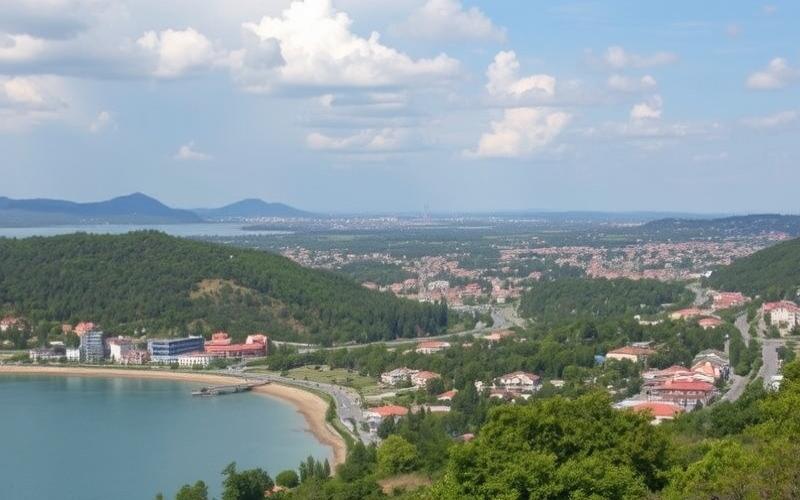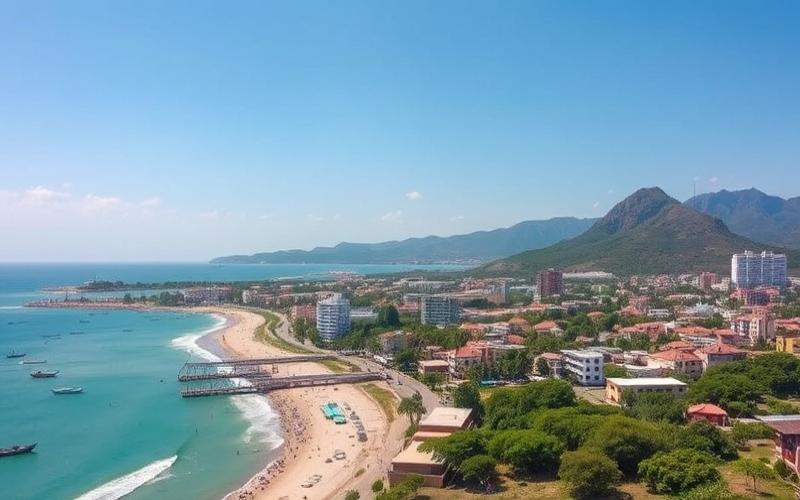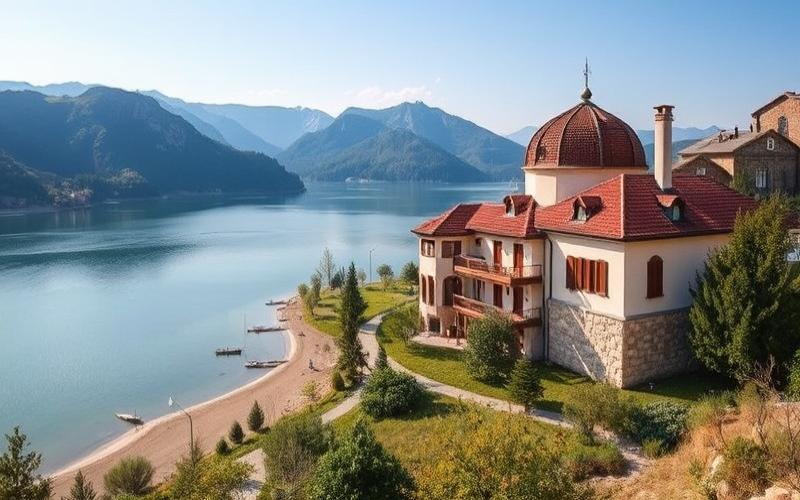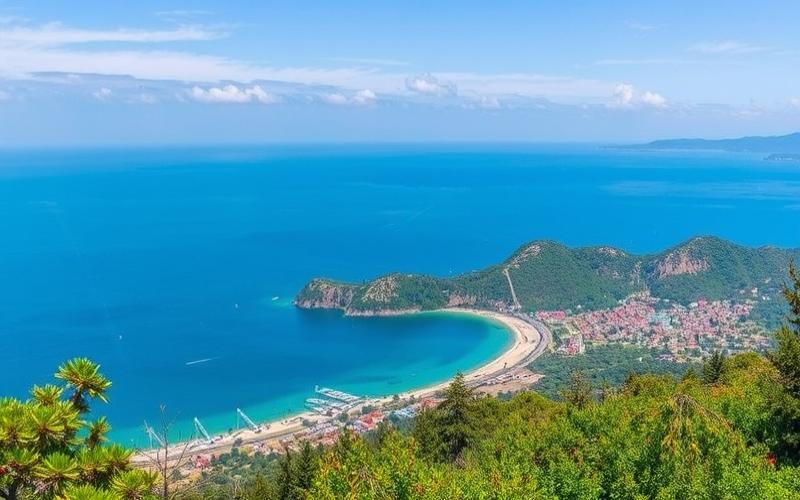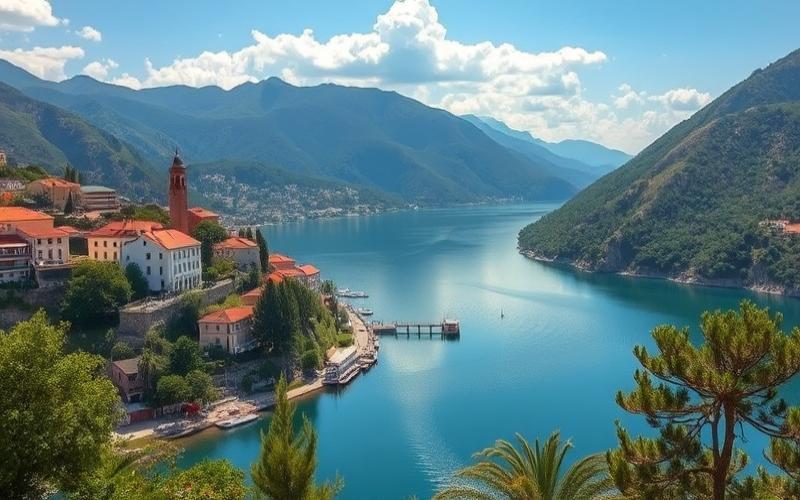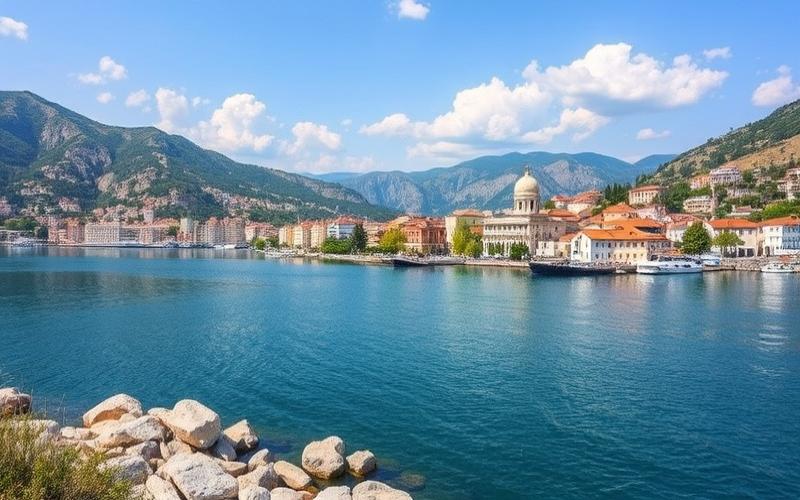
 Published on and written by Cyril Jarnias
Published on and written by Cyril Jarnias
Buying Real Estate in North Macedonia: Pitfalls to Avoid
Purchasing real estate in North Macedonia can be an exciting adventure but one fraught with pitfalls for those who aren’t properly prepared. Between local administrative complexities and the particularities of the Macedonian real estate market, investors can easily fall into traps that could have been avoided.
From unfamiliarity with real estate regulations to misjudging property values, mistakes can quickly turn this thrilling experience into an uphill battle.
This article examines these common errors and offers practical advice to successfully navigate the real estate landscape of this burgeoning country.
Good to Know:
North Macedonia offers attractive real estate opportunities, but proper preparation is essential to avoid unpleasant surprises.
Pitfalls to Avoid When Buying Real Estate in North Macedonia
Common Mistakes When Buying Real Estate in North Macedonia:
- Failure to Verify Property Titles
Many buyers neglect to check the authenticity and regularity of land titles. This lack of vigilance can lead to disputes or the later discovery of hidden mortgages. - Lack of Thorough Property Inspection
Not conducting a serious inspection exposes buyers to structural or technical problems, often costly after purchase. - Underestimating Additional Costs (Taxes, Notary Fees)
Buyers frequently forget ancillary fees such as property taxes, transfer tax, utility connections, and notary fees, which can represent a significant portion of the total budget.
It’s important to consider the transfer tax, property and school taxes, as well as utility-related expenses from the acquisition to avoid any financial surprises.
| Common Mistake | Potential Consequence |
|---|---|
| Failure to Verify Titles | Legal Disputes |
| Superficial Inspection | Late Discovery of Hidden Defects |
| Underestimating Additional Costs | Budget Overrun |
Specific Dangers of the Local Macedonian Market:
- Significant Market Fluctuations
The economic context in North Macedonia is marked by a large informal economy and rapid evolution toward more regulation. This can make the market volatile with a non-negligible political risk. - Unfamiliarity with Local Laws
Real estate rules change regularly due to the rapprochement with the European Union. Many local companies were established in a vague framework after independence; some are not economically viable, increasing the risk in a real estate transaction.
The shadow economy represents over 20% of the national GDP; there are also many illegal workers and a sometimes unstable legal environment.
Practical Tips to Secure Your Investment:
Collaborating with these professionals is highly recommended:
- Experienced real estate agents with good knowledge of the local terrain
- Lawyers specialized in Macedonian real estate law
List of Benefits:
- Complete Legal Security
- Rigorous Verification of Administrative Documents
- Informed Negotiation Based on Actual Market Knowledge
Hiring a specialized lawyer not only helps avoid classic pitfalls but also ensures total legal compliance during any real estate acquisition in North Macedonia.
Good to Know:
When buying real estate in North Macedonia, it’s crucial to avoid several common pitfalls. Make sure to meticulously check property titles to prevent future disputes and have a thorough inspection conducted to detect any potential hidden defects. Don’t underestimate additional costs, such as taxes and notary fees, which can significantly increase your budget. Also be wary of local market fluctuations that can impact your investment’s profitability. Laws and regulations in North Macedonia may differ from those in other countries, so thorough knowledge is essential to navigate the real estate purchase smoothly. Collaborating with experienced real estate agents and lawyers specialized in local real estate law is highly recommended to ensure a confident transaction.
How to Recognize Signs of a Bad Real Estate Deal
Indicators to Watch For to Avoid a Bad Real Estate Deal in North Macedonia:
- Potential Seller Over-indebtedness: A seller looking to quickly dispose of a property, especially at a very low price, may indicate over-indebtedness or the presence of hidden debts associated with the property.
- Lack of Clear Cadastral Information: If cadastral information is incomplete, contradictory, or inaccessible, it may signal legal or administrative irregularities regarding the property.
- Undeclared Work: The existence of structural modifications or extensions carried out without official authorization significantly increases the risk of future disputes and exposes the buyer to penalties.
Risks Related to Seller Lack of Transparency and Abnormally Low Prices:
A price significantly below the local market can conceal serious defects (ongoing disputes, hidden defects, urban planning issues) or indicate that the property does not comply with local regulations.
The seller’s lack of transparency, for example the absence of official documents (clear land titles, ownership history), should immediately raise a red flag. In a context where the informal economy is significant and some properties haven’t been regularized after the country’s independence, these situations are frequent.
| Critical Indicator | Associated Risk |
|---|---|
| Underpriced | Hidden Defects / Legal Problems |
| Incomplete Cadastre | Disputes / Not Actual Ownership |
| Undeclared Work | Fines / Demolition Obligation |
| Absence of Official Documents | Contestable Transaction |
Macedonian Specificities and Local Risks:
- North Macedonia has a significant informal economy; many businesses and properties emerged in a vague legal context after independence. Transactions can thus be impacted by poorly defined or contestable rights.
- The local legal system can add complexity to real estate transactions. Past ethnic conflicts have sometimes left ambiguous land situations where multiple parties claim the same property.
- There is also a latent political risk that can impact economic and legal stability.
Importance of Accurate Assessment in the Local Market:
It’s crucial to compare the estimated property value with prices actually practiced in its geographical area in order to:
- Detect any potentially suspicious pricing anomalies;
- Avoid any overpriced purchase in a sluggish sector;
- Negotiate effectively with the seller based on recent local references.
Practical Tips for Conducting Due Diligence:
- Systematically request all recent cadastral extracts as well as any documents related to work done on the property (administrative permits).
- Carefully compare listed prices with those observed for similar properties in the concerned region (local real estate benchmarking).
- Imperatively consult an independent Macedonian notary who will verify:
- The exact and unique identity of the owner,
- The possible absence of mortgages/liens/obligations on the property,
- Overall regulatory compliance (urban planning/location/licenses).
- If possible, also consult a lawyer specialized in local real estate law to anticipate all issues related to national legal specificities.
- Contact municipal authorities to directly verify any information related to the concerned property before final signing.
In this complex regional context—where attention to every administrative detail is paramount—it is recommended to never sign anything without double notarial/legal local validation, as any irregularity could render your investment unusable or even illegal according to future evolution of national/Macedonian laws.
If persistent doubt remains about the complete legality of a real estate file proposed in North Macedonia, it’s better to abstain rather than risk total financial loss linked to a legal procedure that’s difficult to arbitrate locally.
Good to Know:
To spot a bad real estate deal in North Macedonia, be vigilant about potential seller over-indebtedness and the absence of clear cadastral information; also verify the existence of undeclared work. Be wary of prices well below the local market, a possible sign of hidden problems, such as the seller’s lack of transparency. Make sure to compare the property’s value with rates practiced in the region, due to local legal particularities that can complicate transactions. Protect yourself against non-compliance with regulations by consulting local experts, like a notary or lawyer, to conduct due diligence. By paying attention to these aspects, you’ll avoid costly mistakes and succeed in your real estate project in North Macedonia.
Financial Mistakes Not to Make When Acquiring a Property
Financial Mistakes to Avoid When Acquiring a Property in North Macedonia
Properly understanding exchange rates and local tax implications is paramount. Currency fluctuations can impact the total acquisition cost, especially if your financing or income is in euros while the transaction is in Macedonian denars. Furthermore, local taxation often differs from European standards: it’s essential to inform yourself about purchase taxes, property levies, and rental income taxation.
Here is a list of common mistakes to avoid:
- Underestimating Ancillary Fees
- Notary fees
- Annual property taxes
- Registration fees
- Bank costs for international transfer
- Insufficient Verification of Solvency and Borrowing Capacity
- Lack of precise financing simulation
- Failure to account for potential interest rate variations
- Poorly Adjusted or Overvalued Financing Relative to Income
- Borrowing beyond one’s actual capacity can lead to lasting financial imbalance.
- A repayment plan not suited to the family budget increases the risk of default.
- Error in Estimating Future Costs (Renovation/Maintenance)
- Neglecting prior technical diagnosis: potential presence of asbestos, outdated installations.
- Underestimating the real cost of necessary or future work (bringing up to code, structural repairs).
Summary Table:
| Identified Risk | Possible Consequences | Recommended Best Practice |
|---|---|---|
| Poor Exchange Rate Management | Unexpected Overpayment | Monitor Currency Evolution and Budget Accordingly |
| Forgetting Ancillary Fees | Budget Overrun | List All Fees with a Local Expert |
| Unverified Solvency | Bank Refusal or Unsuitable Loan | Prior Bank Simulation |
| Disproportionate Financing | Prolonged Financial Difficulties | Calculate Reasonable Debt Level |
| Underestimated Renovation/Maintenance | Unexpected Post-Purchase Expenses | Technical Expertise Before Acquisition |
Managing each step with rigor not only helps avoid these major errors but also ensures the profitability and peace of mind surrounding the real estate project.
Good to Know:
When buying real estate in North Macedonia, it’s crucial to properly understand exchange rates and their fluctuations to avoid financial surprises, particularly regarding local tax implications which can vary based on the buyer’s country of origin. Often overlooked, ancillary fees such as notary fees and property taxes must be included in the budget to prevent any unexpected overruns. Before committing, it’s essential to verify one’s solvency and borrowing capacity to avoid financing problems; indeed, financing that’s overvalued or poorly adjusted relative to income can lead to significant financial difficulties. Finally, don’t underestimate future costs related to renovation or property maintenance, which can heavily burden your budget if poorly assessed initially.
Negotiating Effectively to Avoid Real Estate Missteps
Before starting any real estate negotiation in North Macedonia, it’s essential to prepare thoroughly. This begins with in-depth research on the local market: understanding price trends, supply and demand dynamics according to cities (Skopje, Ohrid, Bitola…), as well as the specificities of targeted neighborhoods.
| City | Average Price €/m² | Range €/m² |
| Skopje | 1,500 – 2,000 | Up to 2,500 |
| Ohrid | 1,400 – 2,000 | |
| National Average | ≈1,783 | 1,071 to >2,500 |
In urban areas, the average price per square meter is around 1,783 €, with significant variations depending on the exact location. Demand is particularly strong in Skopje and tourist areas like Ohrid.
Main Steps for Effective Negotiation:
- Research recent developments in the local real estate market and compare several similar properties.
- Check if demand is rising or falling in the targeted sector to adjust your negotiation margin.
- Inform yourself about local policies (regulations, property taxes between 0.1% and 0.2%, real estate sales tax at around 10%).
To establish open communication with sellers or agents:
- Prioritize transparent exchange about your real expectations (clearly defined maximum budget).
- Ask specific questions regarding the property’s condition: year of construction, recent or necessary renovations.
- Show interest while remaining professional; avoid any rush.
Key criteria to avoid a hasty purchase include:
- Precise location (city center vs. outskirts)
- General condition of the property
- Current dynamics of the local market
To avoid yielding to emotional pressures or exceeding your budget:
- Determine a firm maximum envelope in advance and stick to it throughout the discussion phase.
- Take time to analyze all received offers without being influenced by an artificially created sense of urgency by some sellers or agents.
Common Mistakes to Avoid:
- Accepting the first offer too quickly
- Neglecting a thorough technical inspection of the property before signing
- Omitting complete verification of legal documents related to the land title
Practical Tips:
- Always request an independent inspection before any final commitment
- Refuse any obscure clauses or pressure aimed at artificially accelerating the transaction
- Systematically seek the advice of a competent local advisor—experienced agent or lawyer specialized in Macedonian real estate law—so every legal step is correctly followed
The presence of a local expert is an indispensable guarantee to secure your real estate acquisition in the specific legal context of North Macedonia.
Good to Know:
To negotiate effectively and avoid missteps when buying real estate in North Macedonia, it’s crucial to prepare thoroughly, particularly by researching the local market. Consult prices of similar properties, their location, condition, and current demand to avoid overpaying. Adopt open and constructive communication with sellers or agents, and remain firm on your budget to avoid yielding to emotional pressures. Be wary of common mistakes such as hastily accepting first offers or the absence of proper property inspection. Finally, ensure all legal procedures are respected by surrounding yourself with local advisors or a lawyer to navigate the specific legal framework of North Macedonia.
Disclaimer: The information provided on this website is for informational purposes only and does not constitute financial, legal, or professional advice. We encourage you to consult qualified experts before making any investment, real estate, or expatriation decisions. Although we strive to maintain up-to-date and accurate information, we do not guarantee the completeness, accuracy, or timeliness of the proposed content. As investment and expatriation involve risks, we disclaim any liability for potential losses or damages arising from the use of this site. Your use of this site confirms your acceptance of these terms and your understanding of the associated risks.






